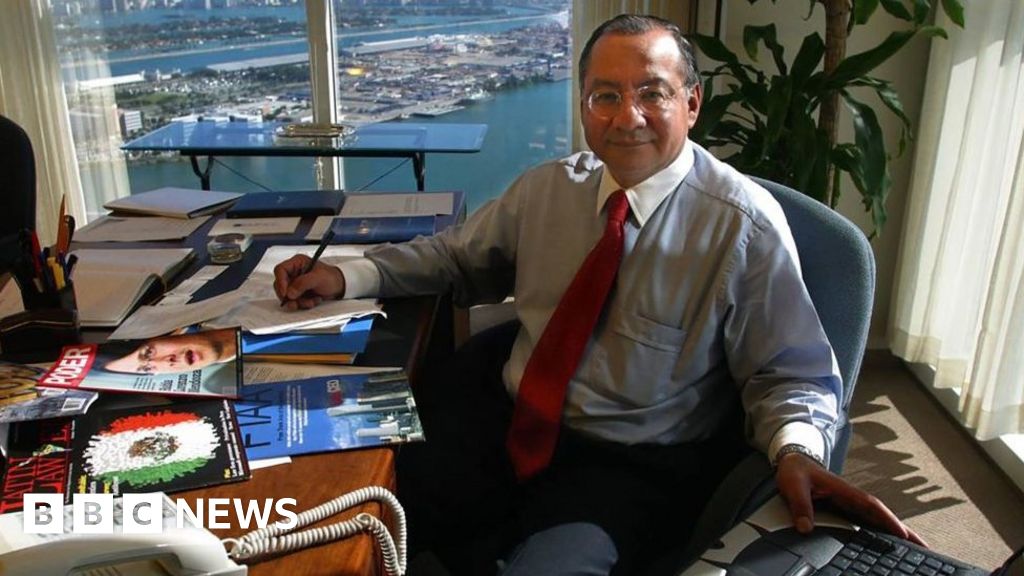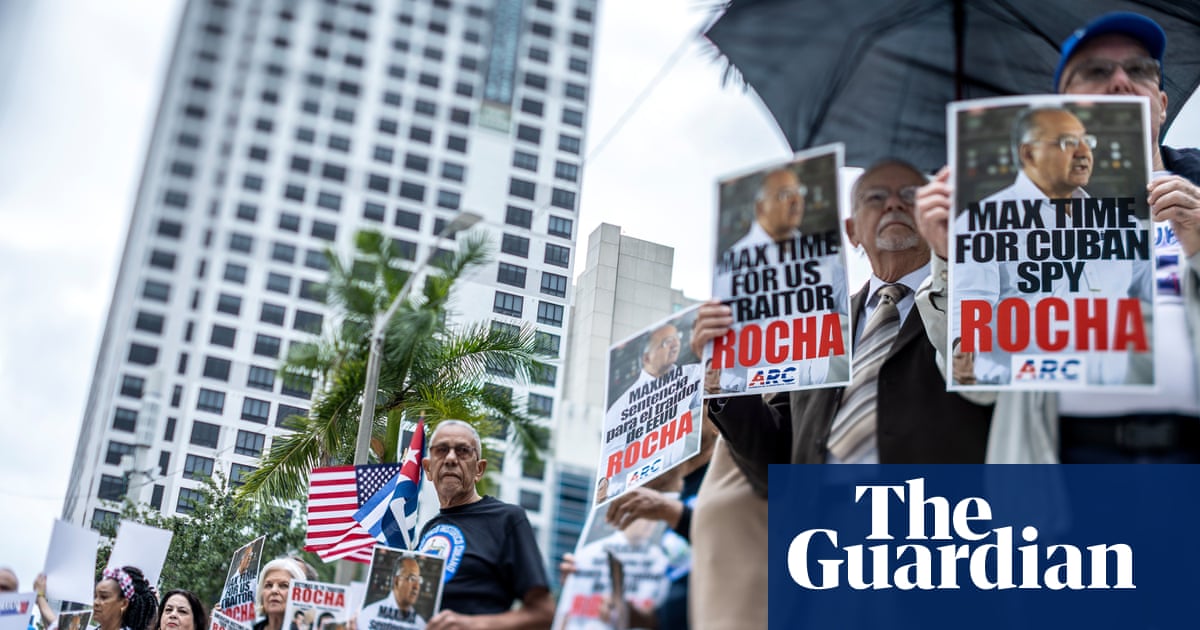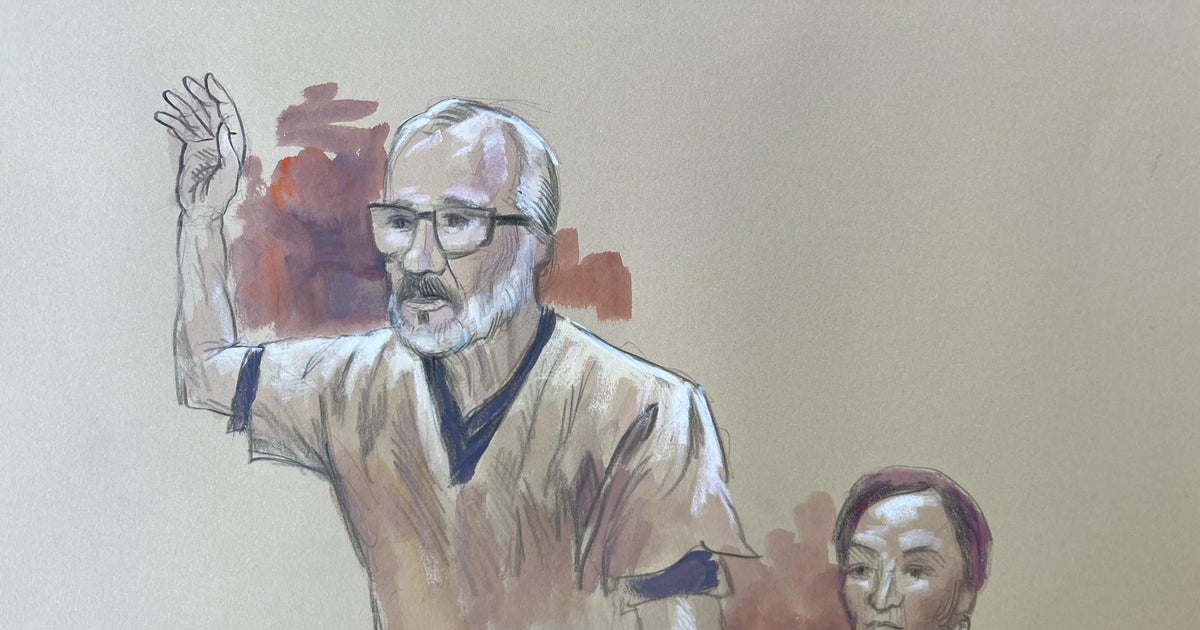
Victor Manuel Rocha, a former US ambassador to Bolivia, has been sentenced to 15 years in prison for secretly passing information to the Cuban government for over 40 years. Rocha changed his plea to guilty in a Miami court, avoiding a trial. He must pay a $500,000 fine, cooperate with authorities, and was described by the US Attorney General as one of the highest-reaching infiltrations of the US government by a foreign agent. Rocha, who served in various diplomatic roles and as a consultant for the US military, was contacted by an undercover FBI agent claiming to represent Cuba's intelligence service, leading to his admission of espionage activities.

Victor Manuel Rocha (born October 23, 1950) is a former American diplomat, Cuban spy, and the former United States Ambassador to Bolivia. Rocha was arrested by federal officials in December 2023 and admitted to acting as an illegal agent of Cuba in April 2024. He was sentenced to 15 years in federal prison.

Former U.S. ambassador to Bolivia and National Security Council member Victor Manuel Rocha has been charged with serving as an agent of the Cuban government for over 40 years, seeking non-public information and influencing U.S. foreign policy against the United States. Attorney General Merrick B. Garland emphasized the betrayal of trust and pledged to enforce justice. Rocha's covert career began in 1980 and he was exposed in 2012. The FBI highlights AI as a tool for criminals, with Rocha being a naturalized U.S. citizen from Colombia aiding Cuba's intelligence efforts.

A suspected member of the US-designated foreign terror group Hezb-e-Islami, Mohammad Kharwin, was apprehended and released multiple times by federal authorities after illegally entering the US near San Ysidro, Calif. Despite suspicions of being on the FBI's terrorist watchlist, Kharwin was released under ICE's Alternatives to Detention program due to inconclusive evidence. His short-lived arrest in San Antonio, Texas, ended with a judge freeing him on a bond of $12,000 without restrictions on his movements within the US, as classified information linking him to the terror group was not disclosed in court proceedings.

Spain is deporting over 60 Bolivians who arrived on a MSC Cruises ship in Barcelona with false visas, causing a delay in the ship's route. 65 Bolivians will be flown back to Santa Cruz, while 4 with Spanish relatives will be allowed to enter Spain. The Bolivians had invalid visas for the Schengen area, leading to the ship being stuck for two days until the issue was resolved.

Cuba, officially the Republic of Cuba, is an island country, comprising the island of Cuba, Isla de la Juventud, archipelagos, 4,195 islands and cays surrounding the main island. Cuba is located where the northern Caribbean Sea, Gulf of Mexico, and Atlantic Ocean meet. Cuba is located east of the Yucatán Peninsula (Mexico), south of both the American state of Florida and the Bahamas, west of Hispaniola (Haiti/Dominican Republic), and north of Jamaica and the Cayman Islands. Havana is the largest city and capital; other major cities include Santiago de Cuba and Camagüey. The official area of the Republic of Cuba is 109,884 km2 (42,426 sq mi) (without the territorial waters) but a total of 350,730 km2 (135,420 sq mi) including the exclusive economic zone. Cuba is the second-most populous country in the Caribbean after Haiti, with over 11 million inhabitants.The territory that is now Cuba was inhabited as early as the 4th millennium BC, with the Guanahatabey and Taíno peoples inhabiting the area at the time of Spanish colonization in the 15th century. It was then a colony of Spain, and slavery was abolished in 1886, remaining a colony until the Spanish–American War of 1898, when Cuba was occupied by the United States and gained independence in 1902. In 1940, Cuba implemented a new constitution, but mounting political unrest culminated in the 1952 Cuban coup d'état and the subsequent dictatorship of Fulgencio Batista. The Batista government was overthrown in January 1959 by the 26th of July Movement during the Cuban Revolution. That revolution established communist rule under the leadership of Fidel Castro. The country was a point of contention during the Cold War between the Soviet Union and the United States, and nuclear war nearly broke out during the Cuban Missile Crisis of 1962. Following the dissolution of the Soviet Union, Cuba faced severe economic downturn in the 1990s, known as the Special Period. In 2008, Fidel Castro retired after 49 years; Raúl Castro was elected his successor. Raúl Castro retired as president in 2018 and Miguel Díaz-Canel was elected president by the National Assembly following parliamentary elections. Raúl Castro retired as First Secretary of the Communist Party in 2021 and Díaz-Canel was elected.Cuba is one of a few extant Marxist–Leninist one-party socialist states, in which the role of the vanguard Communist Party is enshrined in the Constitution. Cuba has an authoritarian regime where political opposition is not permitted. Censorship is extensive and independent journalism is repressed; Reporters Without Borders has characterized Cuba as one of the worst countries for press freedom. Culturally, Cuba is considered part of Latin America. It is a multiethnic country whose people, culture and customs derive from diverse origins, including the Taíno Ciboney peoples, the long period of Spanish colonialism, the introduction of enslaved Africans and a close relationship with the Soviet Union during the Cold War.Cuba is a founding member of the United Nations, G77, Non-Aligned Movement, Organisation of African, Caribbean and Pacific States, ALBA, and Organization of American States. It has one of the world's few planned economies, and its economy is dominated by tourism and the exports of skilled labor, sugar, tobacco, and coffee. Cuba has historically—before and during communist rule—performed better than other countries in the region on several socioeconomic indicators, such as literacy, infant mortality and life expectancy. Cuba has a universal health care system which provides free medical treatment to all Cuban citizens, although challenges include low salaries for doctors, poor facilities, poor provision of equipment, and the frequent absence of essential drugs. A 2023 study by the Cuban Observatory of Human Rights (OCDH), estimated 88% of the population is living in extreme poverty. The traditional diet is of international concern due to micronutrient deficiencies and lack of diversity. As highlighted by the World Food Programme (WFP) of the United Nations, rationed food meets only a fraction of daily nutritional needs for many Cubans, leading to health issues.

Lawmakers plan to address current issues at President Biden's State of the Union, expected to be a referendum on Biden's age ahead of the 2024 campaign. Guests include Cuban dissident Maria Paya Acevedo, with her family suing former US Ambassador Manuel Rocha for conspiring in her father's death. Reps Jayapal and Omar denounce Cuba's brutality. Republicans aim to hold Biden accountable for the Afghanistan withdrawal.

The economy of Cuba is a mixed planned economy dominated by state-run enterprises. Most of the labor force is employed by the state. In the 1990s, the ruling Communist Party of Cuba encouraged the formation of worker co-operatives and self-employment. In the late 2010s, private property and free-market rights along with foreign direct investment were granted by the 2018 Cuban constitution. Foreign direct investment in various Cuban economic sectors increased before 2018. As of 2021, Cuba's private sector is allowed to operate in most sectors of the economy. As of 2023, public-sector employment was 65%, and private-sector employment was 35%, compared to the 2000 ratio of 76% to 23% and the 1981 ratio of 91% to 8%. Investment is restricted and requires approval by the government. In 2021, Cuba ranked 83rd out of 191 on the Human Development Index in the high human development category. As of 2012, the country's public debt comprised 35.3% of GDP, inflation (CDP) was 5.5%, and GDP growth was 3%. Housing and transportation costs are low. Cubans receive government-subsidized education, healthcare, and food subsidies.At the time of the Cuban Revolution of 1953–1959, during the military dictatorship regime of Fulgencio Batista, Cuba's GDP per capita was ranked 7th in the 47 economies of Latin America. Its income distribution compared favorably with that of other Latin American countries. However, "available data must be viewed cautiously and assumed to portray merely a rough approximation of conditions at the time," according to Susan Eckstein. However, there were profound social inequalities between city and countryside and between whites and blacks, and Cuba had a trade and unemployment problem. According to the American PBS program American Experience, "[o]n the eve of Fidel Castro's 1959 revolution, Cuba was neither the paradise that would later be conjured by the nostalgic imaginations of Cuba's many exiles nor the hellhole painted by many supporters of the revolution." The socialist revolution was followed by the ongoing United States embargo against Cuba, described by William M. LeoGrande as "the oldest and most comprehensive US economic sanctions regime against any country in the world."Between 1970 and 1985, Cuba experienced high-sustained rates of growth; according to Claes Brundenius, "Cuba had done remarkably well in terms of satisfying basic needs (especially education and health)" and "was actually following the World Bank recipe from the 1970s: redistribution with growth". During the Cold War, the Cuban economy was heavily dependent on subsidies from the Soviet Union, valued at $65 billion in total from 1960 to 1990 (over three times as the entirety of U.S. economic aid to Latin America through the Alliance for Progress), an average of $2.17 billion a year. This accounted for between 10% and 40% of Cuban GDP, depending on the year. While the massive Soviet subsidies enabled Cuba's enormous state budget, they did not lead to a more advanced or sustainable Cuban economy. Described by economists as "a relatively highly developed Latin American export economy" in 1959 and the early 1960s, Cuba's fundamental economic structure changed very little between then and 1990. Tobacco products such as cigars and cigarettes were the only manufactured products among Cuba's leading exports, and a pre-industrial process produced even these. The Cuban economy remained inefficient and over-specialized in a few highly subsidized commodities provided by the Eastern Bloc countries. Following the fall of the Soviet Union, Cuba's GDP declined by 33% between 1990 and 1993, partially due to the loss of Soviet subsidies and a crash in sugar prices in the early 1990s. This period of economic stagnation and decline is known as the Special Period. Cuba's economy rebounded in the early 2000s due to a combination of marginal liberalization of the economy and heavy subsidies from the government of Venezuela, which provided Cuba with low-cost oil and other subsidies worth up to 12% of Cuban GDP annually.

The FBI has arrested Alexander Mercurio, an 18-year-old in Idaho, for planning a violent attack on churches in Coeur d'Alene on behalf of ISIS. Mercurio devised a plan to attack people attending churches, incapacitate his father, and steal firearms for maximum casualties. FBI Director Christopher Wray stated that Mercurio pledged loyalty to ISIS, but the plot was detected and thwarted by the FBI's Joint Terrorism Task Force. Attorney General Merrick Garland emphasized the DOJ's commitment to pursue and hold accountable those planning terrorism against the US.

Chinese software engineer Linwei Ding, also known as Leon Ding, was arrested in California for allegedly stealing artificial intelligence technology from Google while secretly working for Chinese companies. US Attorney General Merrick Garland stated that Ding faces four counts of theft of trade secrets, highlighting the importance of protecting sensitive technologies for national security. FBI Director Christopher Wray condemned the theft, emphasizing the economic and national security consequences. Ding was accused of transferring confidential Google information to his personal account while affiliated with Chinese AI companies, jeopardizing American innovation.

A cruise ship in Barcelona is delayed due to forged Schengen visas held by 69 Bolivian passengers onboard who were not allowed to disembark, with suspicions of a scam involving up to $10,000 per person for passage and visas. The ship, MSC Armonia, planned to continue sailing through the Mediterranean but is held up for investigation. There are concerns that the Bolivians may have intended to enter Spain illegally. The vessel has about 1,500 passengers overall.

Hundreds of protesters in Cuba are rallying against food shortages and frequent blackouts, with the largest demonstrations centered in Santiago de Cuba. The country faces an energy crisis, worsened by waves of blackouts and a lack of transportation and fuel. Cuba's economy deteriorated during the pandemic, aggravated by sanctions and a financial deficit, causing a shortage of basic necessities. The government has limited food allocations, with conditions likened to the Special Period after the Soviet Union's collapse. Despite government accusations and mild responses, protesters are determined to continue demanding improvements.






CBS News

Associated Press in Miami

NY Post

https://apnews.com/author/gisela-salomon

Fox News

https://www.facebook.com/bbcnews

Dolores Chang

Wikipedia

PANORA

PANORA

PANORA

Wikipedia

PANORA

Wikipedia

PANORA

PANORA

PANORA

PANORA